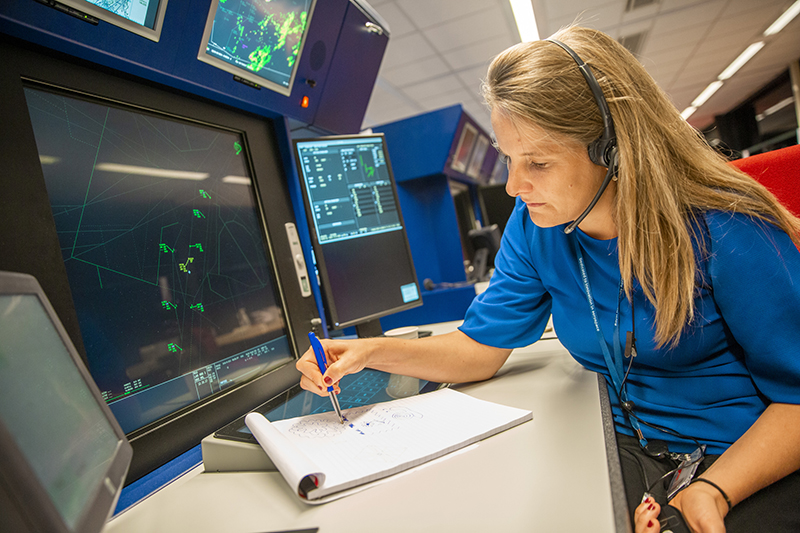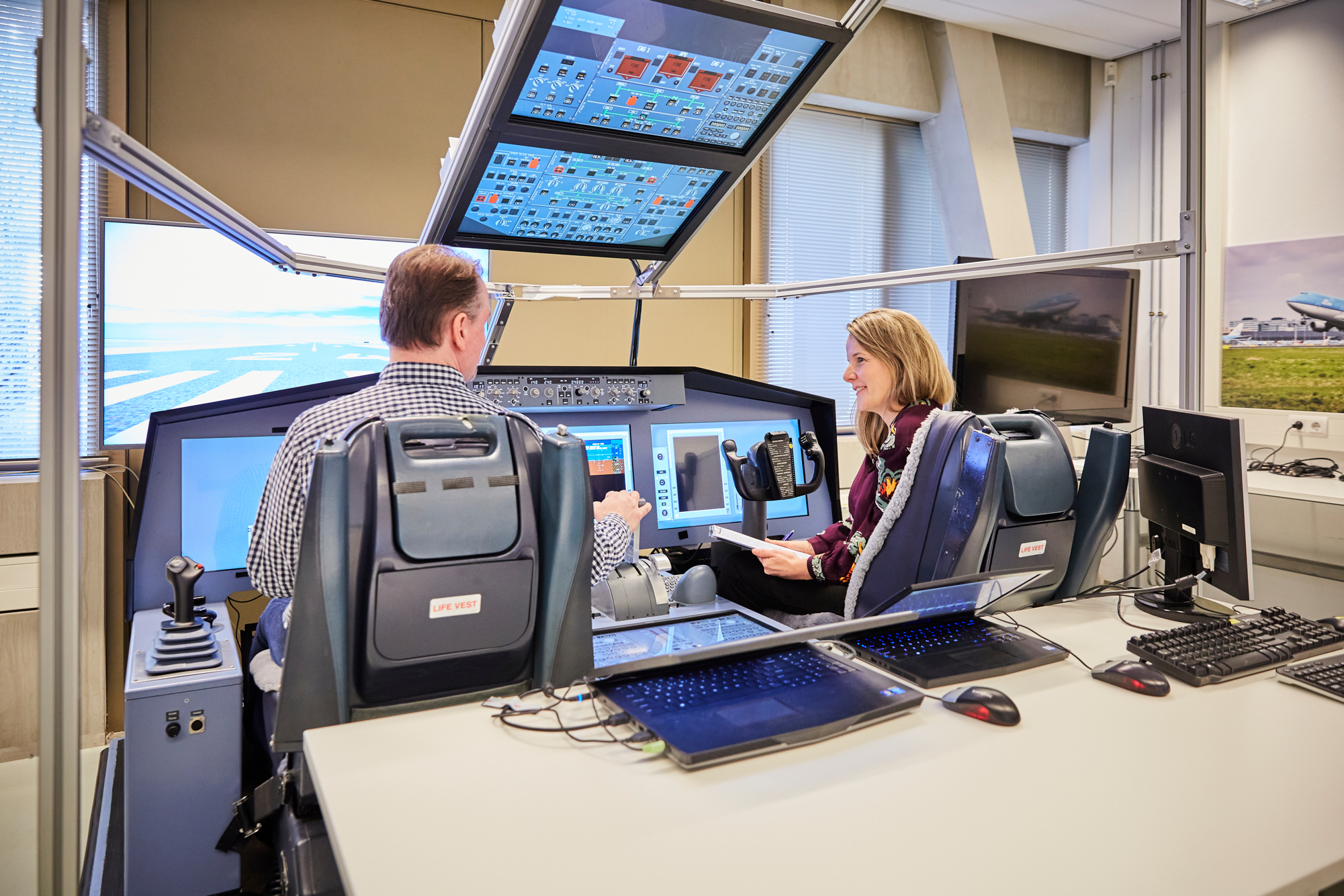In the series ‘NLR People’, we show you who the experts at the Royal Netherlands Aerospace Centre are, what drives them, and what they are working on behind the scenes. In this episode: Jenny Eaglestone, senior R&D engineer and aviation psychologist at the Aerospace Operations Department.
The human side of aviation
Jenny Eaglestone had to put her dream of becoming a journalist aside when they turned her away at the School of Journalism in Utrecht. That was back in 1997, three years after Jenny had immigrated – along with her sister and parents – to the Netherlands from the United Kingdom.
Now, it’s 2024 and Jenny works for the Royal Netherlands Aerospace Centre (NLR) as a senior R&D engineer and aviation psychologist. Prior to being at NLR she worked, among others, for the Dutch Ministry of Defence, Air Traffic Control The Netherlands (LVNL) and the Dutch embassy in Washington D.C. Jenny grew up in a family with lots of freedom and only a few rules, she just had to be home on time and be polite to others. That’s quite a contrast with her career now, in an operational world where strict rules apply and work is often carried out under pressure.
Improving the self-knowledge of operational staff
A little over two years ago, Jenny sent an open application to NLR. “I think it began with ‘I believe you are in need of an aviation psychologist.’ A couple of months later, I was getting to know my way around the NLR complex in Amsterdam.”
At NLR, Jenny is involved in the human side of aviation. “I conduct extensive research on the effect of individuals’ characteristics on their work in aviation. I’m also involved in improving selection procedures and developing human factors training”
“The human aspect still doesn’t get the attention it deserves in the aerospace sector,” says Jenny emphatically, “and this despite it having a major effect on the operational side of aviation.” Her tasks as an aviation psychologist include improving the self-knowledge of operational staff.
“As a pilot, you’re a manager and a good manager is self-aware: you should know who you are, how you behave and how you respond in exceptional situations. After all, who you are affects your work as a pilot, air traffic controller or cabin crew. I try to make people aware and help them carry out their work as well as possible, making sure they’re prepared for action in stressful and challenging situations.”
“Mental wellbeing does not get enough attention in our sector, despite having a significant effect on the operational side of aviation.”
More effective training, measuring soft skills and gender differences
Jenny is part of the Evidence-Based Training (EBT) team at NLR. This training philosophy has been recognised by EASA since 2021 as a method for recurrent pilot training. It is a form of competence-based training that utilises performance data. EBT gathers training data and uses it to tailor training to the actual needs of the pilot in terms of competencies. It is therefore not a general, but more personalised training approach.
“NLR is helping airlines and national aviation authorities make the transition to EBT by providing training courses and consultancy,” says Jenny. “We explain how organisations can move away from more traditional ways of training, to EBT. and we educate instructors so that they can provide training following the principles of EBT.
Commissioned by the Dutch Ministry of Defence, she is also studying how soft skills (non-technical competencies) can be measured using objective data. “Take decisiveness, for example – a crucial competence for a pilot. At the moment, an instructor or psychologist has to use their own observations to assess whether candidates and students are decisive enough. That’s a subjective assessment; in this  research, we’re looking at whether it’s possible to reach a more objective evaluation by supporting the assessor with objective data from the simulator. Data such as response time, gaze measurement or the number and length of radio messages.”
research, we’re looking at whether it’s possible to reach a more objective evaluation by supporting the assessor with objective data from the simulator. Data such as response time, gaze measurement or the number and length of radio messages.”
Jenny is also studying gender differences in aviation training. The long term aim is to improve training results through targeted recommendations on gender sensitivity. “Most aviation training courses are given by men, for men. But how does this affect non-male participants? Could more gender sensitivity in aviation training improve students’ results? We’re investigating whether gender sensitivity in aviation training is a valuable concept for improving training results.”
No-nonsense and practical
Jenny’s life story is somewhat unusual: she has travelled all over the world, lived on different continents, and she worked for the Dutch Air Traffic Control for eight years. The key lesson from her upbringing is that you can achieve anything you want if you work hard enough.
So when her plans to become a journalist didn’t work out, Jenny didn’t just sit around feeling sorry for herself. She studied Social and Organisational Psychology at Utrecht University, and that suited her down to the ground. When she ended up working as a psychologist for the Defence department, helping design the recruitment and selection procedures, she realised that this was the career for her. The operational sector suits her well, thanks to its strong practical orientation and no-nonsense approach.
Jenny has found the same no-nonsense, practical atmosphere at NLR too. “The nice thing here is the variety: I work on many different kinds of projects.” On top of her work for the Defence department and the EBT team, she is also part of the team that develops Crew Resources Management training courses for an airline. CRM involves training non-technical skills to enable a team to act optimally during critical situations. A large portion of operational personnel is required to undergo CRM training periodically. “Along with education scientists, pilots and other experts, we assess the knowledge needed for handling complex situations during a flight.”
‘There’s nothing better’
In addition to her work for NLR, Jenny is also a board member for the European Association for Aviation Psychology (EAAP). There are two main factors that make her enjoy that so much. “EAAP has been trying to draw more attention to human performance within the aviation sector since 1956, and this role means I can genuinely make a difference in that regard. It also means that I know what’s going on in my field. On top of that, I just like to organise things, whether it’s a birthday party or a conference.” (She says, laughing.)
Jobs in the aviation sector are changing, partly due to the increasing influence of technology. “This makes it even more important to understand the role of humans”, says Jenny. “As long as people are needed to keep planes in the air, to maintain them and to manage the traffic, there’s work to be done. Luckily! Because there’s nothing more interesting than studying and analysing people’s behaviour, and helping them carry out their work as well as possible.”
—
More inspiring NLR People stories: NLR People
